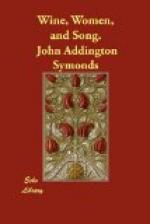Truly mine is no harsh doom,
While in this secluded room
Venus lights for me the gloom!
Flora faultless
as a blossom
Bares
her smooth limbs for mine eyes;
Softly shines
her virgin bosom,
And
the breasts that gently rise
Like
the hills of Paradise.
Oh, the joys of this possessing!
How unspeakable the blessing
When
my Flora is the prize!
From her tender breasts decline,
In a gradual curving line,
Flanks like swansdown white
and fine.
On her skin the
touch discerneth
Naught
of rough; ’tis soft as snow:
’Neath the
waist her belly turneth
Unto
fulness, where below
In
Love’s garden lilies blow.
Oh, the joys of this possessing!
How unspeakable the blessing!
Sweetest
sweets from Flora flow!
Ah! should Jove but find my
fair,
He would fall in love, I swear,
And to his old tricks repair:
In a cloud of
gold descending
As
on Danae’s brazen tower,
Or the sturdy
bull’s back bending,
Or
would veil his godhood’s power
In
a swan’s form for one hour.
Oh, the joys of this possessing!
How unspeakable the blessing!
How
divine my Flora’s flower!
A third “poem of privacy” may be employed to temper this too fervid mood. I conceive it to be meant for the monologue of a lover in the presence of his sweetheart, and to express the varying lights and shades of his emotion.
THE LOVER’S MONOLOGUE.
No. 35.
Love rules everything that
is:
Love doth change hearts in
a kiss:
Love seeks devious ways of
bliss:
Love
than honey sweeter,
Love
than gall more bitter.
Blind Love hath no modesties.
Love is lukewarm,
fiery, cold;
Love is timid,
overbold;
Loyal, treacherous,
manifold.
Present time is fit for play:
Let Love find his mate to-day:
Hark, the birds, how sweet
their lay!
Love
rules young men wholly;
Love
lures maidens solely.
Woe to old folk! sad are they.
Sweetest woman
ever seen,
Fairest, dearest,
is my queen;
And alas! my chiefest
teen.
Let an old man, chill and
drear,
Never come thy bosom near;
Oft he sleeps with sorry cheer,
Too
cold to delight thee:
Naught
could less invite thee.
Youth with youth must mate,
my dear.
Blest the union
I desire;
Naught I know
and naught require,
Better than to
be thy squire.




